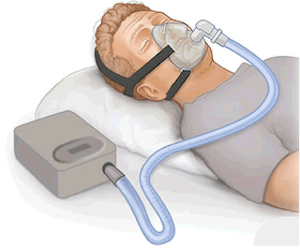Philips CPAP, BiPAP, & Mechanical Ventilator Recall
 Effective June 14, 2021, Philips Respironics initiated a voluntary recall for specific Philips Respironics models of continuous positive airway pressure (CPAP), bilevel positive airway pressure (BiPAP), and mechanical ventilator devices. Philips stated that the recall is “to ensure patient safety in consultation with regulatory agencies.” Of the three to four million recalled devices, approximately 80% are CPAP devices commonly used for sleep apnea. If you or a loved one previously used one of the recalled machines and sustained injuries or illnesses, you may be eligible for a monetary settlement. Contact the CPAP, BiPAP & mechanical ventilator injury attorneys Hollis, Wright & Clay, PC today for a free review and consultation.
Effective June 14, 2021, Philips Respironics initiated a voluntary recall for specific Philips Respironics models of continuous positive airway pressure (CPAP), bilevel positive airway pressure (BiPAP), and mechanical ventilator devices. Philips stated that the recall is “to ensure patient safety in consultation with regulatory agencies.” Of the three to four million recalled devices, approximately 80% are CPAP devices commonly used for sleep apnea. If you or a loved one previously used one of the recalled machines and sustained injuries or illnesses, you may be eligible for a monetary settlement. Contact the CPAP, BiPAP & mechanical ventilator injury attorneys Hollis, Wright & Clay, PC today for a free review and consultation.
The recalled devices include all devices manufactured before April 26, 2021 and include the following models:
- A-Series BiPAP A30® and Hybrid A30®
- A-Series BiPAP A40®
- A-Series BiPAP V30 Auto®
- C-Series ASV®
- C-Series S/T and AVAPS®
- Dorma 400®
- Dorma 500®
- DreamStation®
- DreamStation ASV®
- DreamStation Go®
- DreamStation ST, AVAPS®
- E30®
- Garbin Plus®, Aeris®, LifeVent®
- OmniLab Advanced+®
- REMstar SE Auto®
- SystemOne ASV4®
- SystemOne (Q-Series)®
- Trilogy 100®
- Trilogy 200®
The recall addresses potential health risks, including cancer, related to the polyester-based polyurethane (PE-PUR) sound abatement foam used in the above devices. If you or someone you love has experienced any respiratory health issues you think may be linked to one of these devices, please contact us as soon as possible at 844.LAW.TALK or 205.324.3600 or through the form to the right for a free and confidential consultation regarding your claim. The Philips Respironics device recall attorneys at Hollis, Wright & Clay, P.C. have a proven track record of holding companies accountable for placing dangerous and defective drugs and medical devices on the market.
June 20, 2024—Settlement Update
We predicted in our January 4, 2024 update that this litigation would make a lot of progress in 2024. What we did not anticipate is that a global settlement would be reached and announced by the end of April of 2024. However, this did occur on April 30, 2024. Since the announcement, information and details about the settlement have been published. Yet, there is still a lot that is unknown. What is known is that it appears there were approximately 60,000 known claimants at the time the settlement was announced. However, the 60,000 claimants make up a wide variety of injuries and conditions, many of which will not constitute a "qualifying" injury.
Thus, the number of "qualifying" claimants will be far less than 60,000. Also, it remains to be seen what factors or criteria will apply to these cases to determine a per-case settlement value. Certainly, length of CPAP usage, the sustained injury or type of cancer, the severity or stage of the injury or cancer, the age of the claimant, any comorbidities or pre-existing conditions of the claimant, any history of smoking, the length of time between last CPAP usage and diagnosis of injury or cancer will all be driving factors in this determination. Nevertheless, the settlement announcement is great news for victims and is a big step towards compensation.
January 4, 2024—Update
Judge Conti recently entered a scheduling order for the CPAP litigation which concerns personal injury and wrongful death claims. This is good news as it moves these cases one step closer to trials and perhaps a resolution. To this point, these cases have moved rather slowly but 2024 could prove to be a very productive year in the CPAP litigation. The scheduling order has many critical deadlines that will really influence the direction of this litigation and provide much needed framework. Although these deadlines are subject to extensions, the deadlines set forth in the scheduling order are:
| 4/30/2024 | Conclusion of general causation fact discovery. |
| 5/30/2024 | Plaintiffs' Rule 26(a)(2) expert disclosures on general causation. |
| 7/30/2024 | Defendants' Rule 26(a)(2) expert disclosures on general causation. Conclusion of generally-applicable fact discovery, including Defendant and non-party depositions. |
| 8/30/2024 | Parties to submit stipulated or competing proposals for selection of individual bellwether personal injury cases for trial. Plaintiffs' Rule 26(a)(2) rebuttal expert disclosures on general causation. |
| 10/30/2024 | Deadline to complete expert depositions on general causation. |
| 12/2/2024 | Deadline to file Rule 702/Daubert motions on general causation experts. |
| 1/17/2025 | Deadline for Parties to file oppositions to Rule 702/Daubert motions on general causation experts. |
| 2/18/2025 | Deadline for reply briefs on Rule 702/Daubert motions on general causation. |
To the extent these CPAP cases are not resolved, it certainly appears as if the first trials will take place in 2025. However, it remains to be seen which cases will be tried and how many will be tried in 2025. While the wheels of justice are moving slowly in the CPAP litigation, they are moving and this is welcomed news.
March 3, 2022 Update
On February 15, 2022, Judge Joy Flowers Conti appointed 33 attorneys, including 18 female attorneys, to leadership posts for the Plaintiffs in this litigation. In an interesting move, Judge Conti also created a committee to "mentor future MDL leaders." Attorneys Sandra Duggan of Levin Sedran & Berman; Kelly Iverson of Lynch Carpenter; Steven Schwartz of Chimicles Schwartz Kriner & Donaldson-Smtih; and Christopher Seeger of Seeger Weiss were all appointed as co-lead counsel. A 12-member plaintiffs' steering committee (PSC), co-liaison counsel, and several other committees were also formed, including the "mentoring" committee. The "mentoring committee seems to be designed to provide additional law firms and attorneys with the tools they may need to serve in leadership roles in future MDLs.
November 12, 2021 Update
On October 8, 2021, the judicial panel on multidistrict litigation (MDL) entered an order consolidating all personal injury and wrongful death actions filed in federal courts related to the usage of Philips' recently-recalled CPAP and BiPAP machines. The cases will be consolidated before the Honorable Joy Flowers Conti in the Western District Court of Pennsylvania. As of this update, there are approximately 200 cases now consolidated with Judge Conti, and that number will increase significantly in the coming weeks and months. The Order can be accessed here.
- What does the establishment of a CPAP/BiPAP MDL court mean for your case? This means that any personal injury and wrongful death lawsuits pending in a federal court prior to the creation of the CPAP/BiPAP MDL will now be transferred to Judge Conti in the Western District of Pennsylvania. Further, any and all personal injury and wrongful death cases filed in the future will likewise be transferred to Judge Conti's' court.
- Does this mean that your case will be tried before Judge Conti in Pennsylvania? No, not necessarily. While there is a remote chance that your case could be tried before Judge Conti through what is known as a bellwether trial process, this is very unlikely to occur. If your case does not settle while pending before Judge Conti, then it will ultimately be transferred back to the original federal court where it was filed, very often near your hometown, for trial purposes.
- What if my CPAP/BiPAP lawsuit was filed in a state court, not federal court? If your attorney filed your case in state court, and it was not removed to federal court, then your case is not impacted by the federal MDL order and will remain in state court.
Hollis, Wright & Clay, PC has a dedicated mass tort department that exclusively represents injured victims on a national level against pharmaceutical and medical device manufacturers. Our team of mass tort attorneys, paralegals & investigators have decades of experience investigating these types of claims, reviewing the injured victims’ medical records and filing lawsuits for individuals and families hurt and/or damaged by defective drugs and medical devices, like the CPAP, BiPAP and mechanical ventilator machines. The Hollis, Wright & Clay, PC mass tort team has successfully recovered millions of dollars in compensation on behalf of literally thousands of individuals that have been injured or killed by bad prescription drugs and defective medical device systems and implants.
Health Risks of Philips Sleep Apnea and Other Respironics DevicesPhilips Respironics received complaints regarding black debris in the airpath circuit of the mechanical ventilators, BiPAP, and CPAP devices. There is the potential the recalled devices could cause cancer and have been linked to other health issues. Health issues to be aware of that could be linked to Philips devices include:
- Sinus infection,
- Cough and chest pressure,
- Headaches and dizziness,
- Damage to kidney, liver, or lungs,
- Cancer (kidney, liver, lungs etc.),
- Upper respiratory and airway infections.
The health risk originates with the sound-reducing polyester-based polyurethane (PE-PUR) foam used in the Philips devices. The material degrades into black particles that can either enter the airways or be swallowed. This presents the risk of being exposed to and inhaling dangerous and potentially carcinogenic chemicals. The inherent risk of the material can be exacerbated by the use of various unapproved cleaning methods and/or using the machines in high-heat and high-humidity environments.
There are a number of different types of cancers that could be caused by the release of these bacterial particles. The list includes, but is not limited to, the following:
- Breast cancer
- Brain cancer
- Lymphatic cancer (including non-Hodgkin's)
- Leukemia
- Bladder cancer
- Prostate cancer
- Liver cancer
- Testicular cancer
- Multiple myeloma
- Hematopoietic cancer (immune cell)
- Lung cancer
- Thyroid cancer
- Nasal cancer
- Stomach cancer
- Papillary carcinoma
If you or a loved one has used a Philips CPAP, BiPAP, or ventilator machine and have been diagnosed with kidney, lung, liver disease, or cancer, you may be entitled to compensation. Contact us for a FREE and CONFIDENTIAL consultation at 844.LAW.TALK or 205.324.3600 or here. The trusted attorneys at Hollis, Wright & Clay, P.C. are experienced and well-equipped to hold Philips Respironics responsible for placing unsafe CPAP, BiPAP and/or mechanical ventilators into the marketplace.
 Hollis Wright Home
Hollis Wright Home






